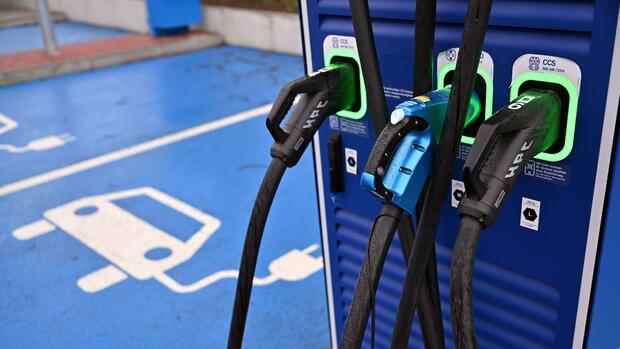There are still too few charging stations for electric vehicles in Germany.
(Photo: dpa)
Berlin Federal Transport Minister Volker Wissing (FDP) must expect resistance to his plan to set up one million charging stations for electric vehicles by the municipalities by 2030.
The general manager of the Association of Towns and Municipalities, Gerd Landsberg, told the Handelsblatt that the electricity charging network was “an important task for society as a whole”. However, it is crucial to “distribute the tasks and burdens evenly”. This cannot be the case with the draft for the new edition of the charging infrastructure master plan.
Criticism also comes from the German Association of Cities. “We want to overcome the car-friendly city,” said General Manager Helmut Dedy. “Replacing combustion cars with electric cars – that’s not a turnaround in traffic.” In the city, the car is just one of many means of transport.
The Federal Minister of Transport no longer only has to argue with the federal states and municipalities about his plan to introduce a discount ticket, the so-called “9 for 90 ticket”, for three months in local public transport on June 1st. There are also problems with the charging stations. In both cases, it is the municipalities that are supposed to implement the goals of the federal government.
Top jobs of the day
Find the best jobs now and
be notified by email.
In view of the ambitious climate goals, the traffic light government has set itself the goal of building a nationwide charging network and thus promoting the sale of electric vehicles. As of April 1, there were a good 50,000 normal and 8,700 fast charging points, just around 2,000 and 300 charging points more than at the beginning of March.
During this period, slightly less than 35,000 new purely electric e-cars were registered. At the beginning of the year, just over 600,000 of these vehicles were on the roads. According to government plans, by 2030 there will be 15 million.
When it comes to the charging infrastructure, Wissing wants to give the municipalities “a key position”. According to the draft for his master plan, which is available to the Handelsblatt, there is currently “not a single public charging point” in half of all municipalities. But a “basic supply” is necessary. The municipalities would be “responsible” for this if no network was created by the private sector.
Binding master plans by the end of 2024
Landsberg sharply criticized the suggestion: “Cities and municipalities are not gas station operators,” he stated. The municipalities could not implement such a “guarantee task”.
The national control center for charging infrastructure of the federal government is to specify supply targets, which are then laid down by law. By the end of 2024, the municipalities should then draw up their own binding master plans for the expansion of the infrastructure and thus ensure that all e-car drivers without their own charging stations will find sufficient charging options in public spaces. That’s what the federal government is planning.
The Association of Towns and Municipalities and Towns Day don’t want to reserve a lot of space. “In order to effectively accelerate the expansion of the charging infrastructure, we must not rely solely on roadside charging,” said Landsberg. Instead, neighborhood solutions would have to be found and retail and gastronomy in particular would have to be more involved than before in the development of the charging infrastructure. Many energy suppliers are already cooperating with the municipalities in expanding the charging network.
“Buses and trains, cyclists and pedestrians need more space in the city,” said City Day Managing Director Dedy. Accordingly, charging stations should be built to save space, for example at petrol stations or in front of supermarkets. There is also potential in multi-storey car parks. In addition, “full profitability is the goal”. The federal and state governments as well as local authorities would promote investors “dedicated”.
Environmental groups call for a tax system per e-car
Environmental organizations, on the other hand, do not even see charging stations as the key factor in getting the market for electric vehicles going. In a letter to Transport Minister Wissing, Federal Finance Minister Christian Lindner (FDP) and Federal Economics Minister Robert Habeck (Greens), Greenpeace and Transport and Environment point out that the climate targets by 2030 can only be achieved if “over 20 million purely battery-electric cars are registered”. . To do this, every second new vehicle must be fully electric by 2025, and by 2030 it would be 85 percent. The letter is available to the Handelsblatt.
The government relies on subsidy programs, purchase bonuses and tax incentives to achieve its goal. The environmental associations, however, are calling for “the revision of the fiscal policy structures”: The tax privilege for company cars for plug-in hybrids and combustion engines should shrink significantly, and entrepreneurs should no longer be able to write off these vehicles. For battery cars, on the other hand, a super write-off should be possible.
In addition, there should be a new registration tax for cars based on emissions. Accordingly, the motor vehicle tax should be based more on how much CO2 a vehicle emits. The associations welcome Minister Habeck’s plan to phase out the purchase premium for plug-in hybrids at the end of the year. Only with all the measures “can the climate goals be achieved in 2030 and climate neutrality in 2045 in Germany”.
More: Wissing no longer wants to expand waterways
